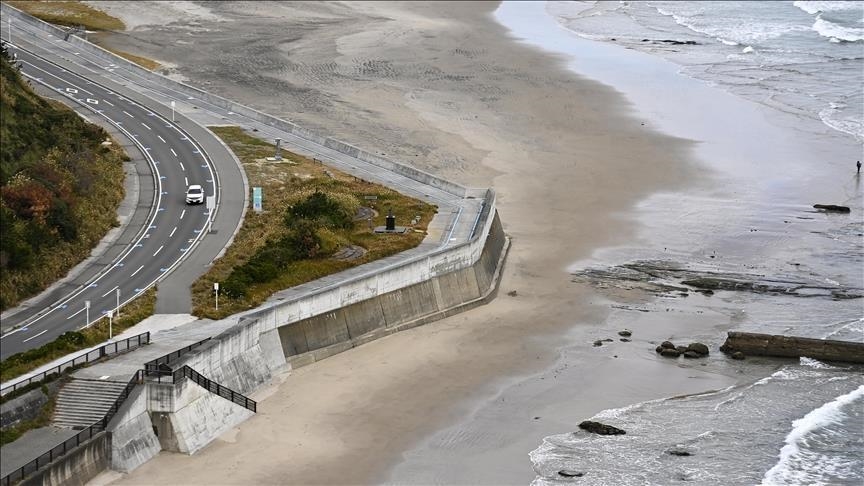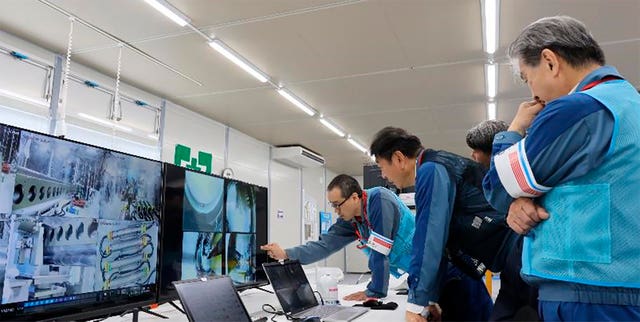Operation to retrieve less than 3 grams of nuclear fuel debris was halted last month
Riyaz ul Khaliq |10.09.2024 -

ISTANBUL
Japan has resumed a trial operation to extract nuclear fuel debris from the crippled Fukushima nuclear power plant, for the first time since the 2011 earthquake and tsunami disaster.
The trial, which aims to extract a small amount of the highly radioactive material, was paused last month when the operator, Tokyo Electric Power Company Holdings or TEPCO, encountered problems during the retrieval process.
The operator had faced an issue in the installation of the robotic removal device -- a telescopic device equipped with a gripper tool.
After confirming that the devices are now correctly installed, the TEPCO “passed the device through an isolation valve, intended to block radioactive material, in the morning (of Tuesday),” the Tokyo-based Kyodo News reported.
The device extends up to 22 meters (72 feet) and the operator is aiming to collect less than 3 grams of debris which can take the device at least two weeks to reach its target.
There are estimated 880 tons of fuel debris remaining in the Nos. 1, 2, and 3 reactors of the crippled nuclear plant.
The Fukushima nuclear plant was damaged when a magnitude 9 earthquake, followed by a tsunami, struck Japan in 2011.
Last month also marked one year since Japan began releasing treated nuclear water from the Fukushima plant.
Robot begins mission to retrieve melted fuel from Fukushima nuclear plant
10 September 2024

Highly radioactive fuel and other materials in the reactors melted when a massive earthquake and tsunami in 2011 damaged the plant’s cooling systems.
An extendable robot has begun a two-week mission to retrieve the first sample of melted fuel debris from inside one of three damaged reactors at Japan’s Fukushima Daiichi nuclear power plant.
Highly radioactive fuel and other materials in the reactors melted when a massive earthquake and tsunami in 2011 damaged the plant’s cooling systems.
The plant’s operator, Tokyo Electric Power Company Holdings (Tepco), has previously used small robots to examine the inside of the reactors, but this is the first time it will have collected a sample of the melted debris in what will mark the start of the most challenging part of the plant’s decades-long decommissioning.
The mission was initially scheduled to begin on August 22 but was suspended when workers noticed that five 5ft (1.5m) pipes to be used to push the robot into the reactor had been arranged in the wrong order, Tepco said.
The equipment was reassembled in the right order for Tuesday’s attempt, the company added.

Once inside the reactor vessel, the robot is operated remotely from a safer location.
The robot, nicknamed “Telesco”, can extend up to about 72ft (22m), including the pipes pushing it from behind, to reach the melted fuel mound, where it will use tongs to collect a fragment weighing less than 0.1oz (3g). It is expected to take about two weeks to obtain the fragment.
An estimated 880 tons of fatally radioactive molten fuel remains in the three reactors.
Chief government spokesman Yoshimasa Hayashi noted that the mission marks the start of the most difficult phase of the Fukushima Daiichi clean-up.
“The government will firmly and responsibly tackle the decommissioning until the very end,” he said.
The government and Tepco have set a 30- to 40-year target for the clean-up, despite criticism that it is unrealistic.
No specific plans for the full removal of the melted fuel debris or its storage have been decided.
No comments:
Post a Comment